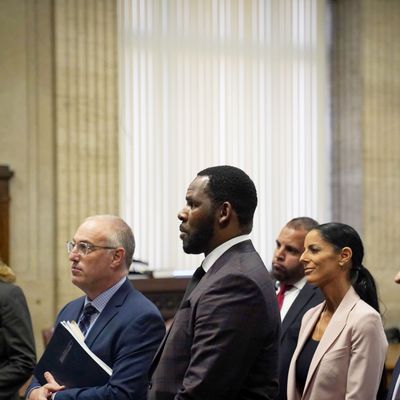
Following years of sexual-misconduct allegations, R. Kelly was arrested on July 11, 2019. The R&B singer was indicted in Brooklyn federal court for racketeering for allegedly engaging in crimes such as sexual exploitation of children, kidnapping, and forced labor. He was also indicted in Chicago federal court on charges of child pornography and obstruction.
Federal authorities maintain that he used his position as a performer to lure victims into his orbit, basically creating an organized system of abuse. Kelly, along with his employees and entourage, “preyed upon women and girls who attended his concerts so that the victims could be available to engage in illegal sexual activity with him at a moment’s notice,” Richard P. Donoghue, a Brooklyn U.S. Attorney at the time, said in a statement on Kelly’s arrest. Kelly also faces local charges in Illinois and Minnesota. He has maintained his innocence on all charges.
After several delays, Kelly’s New York City trial is finally starting. Jury selection began in earnest Monday morning, and opening arguments are scheduled for August 18. Here’s what you need to know about R. Kelly’s trial.
What charges is R. Kelly facing?
In his Brooklyn case, Kelly is facing nine counts of racketeering and various Mann Act violations. (The Mann Act prohibits shuttling people across state lines for illegal sexual activity.) The Feds said Kelly’s racketeering “enterprise” ran from 1994 until his arrest in 2019.
While the racketeering rap might sound a bit confusing for a case involving sexual misconduct, the Feds often use racketeering charges to go after mobsters and gangs (including the case against Tekashi 6ix9ine). Authorities maintain that Kelly’s alleged abuse was part of an orchestrated criminal enterprise. Prosecutors are relying on specific accusations of sexual misconduct — such as his alleged targeting of minors and psychological manipulation — to make that argument.
Kelly, his managers, personal assistants, bodyguards, drivers, and other cronies, shared a “common purpose of achieving the objectives of the Enterprise” to bolster his music and brand while luring girls and women into illegal sexual activity, federal prosecutors said in court papers. They claim that Kelly’s accusers “were not permitted to leave their room without receiving permission … including to eat or go to the bathroom,” and “were required to wear baggy clothing when they were not accompanying Kelly to an event or unless otherwise instructed by Kelly.”
These accusers were also not permitted to look at other men and “instead were told to keep their heads down,” and “the women and girls were required to call Kelly ‘Daddy,’” charging papers allege. Brooklyn federal prosecutors also claim that Kelly engaged in “sexual exploitation of children, kidnapping, [and] forced labor” in this criminal enterprise.
What about the Mann Act counts?
Kelly and others “did knowingly and intentionally transport” Jane Doe No. 5 “in interstate commerce, with intent that such individual engage in sexual activity for which a person can be charged with a criminal offense,” according to court papers. The criminal offense in this case would be “unlawful sexual intercourse with a person under 18 years old,” since Jane Doe No. 5 was underage at the time, charging papers say.
In addition to transportation, the Mann Act counts involving Jane Doe No. 5 allege coercion and enticement; Kelly “together with others, did knowingly and intentionally persuade, induce, entice and coerce” Jane Doe No. 5 to engage in illicit sexual activity. Again, the specific offense prosecutors cite is Kelly allegedly having “unlawful sexual intercourse with a person under 18 years old.”
The Mann Act counts relating to Jane Doe No. 6 also involve alleged transportation, as well as coercion and enticement, in early February 2018. With this accuser, Kelly’s underlying crime is that he “engaged in unprotected sexual intercourse with Jane Doe #6 without first informing Jane Doe #6 that he had contracted herpes and [without] obtaining her consent to sexual intercourse in these circumstances,” prosecutors said.
Wait, weren’t there more accusers in the Brooklyn case?
Yes. It gets a little confusing because of how the accusers are presented in charging documents. The Mann Act counts are specifically for Jane Doe No. 5 and Jane Doe No. 6. However, the racketeering charge is based on numerous instances — called “acts” — of alleged criminal conduct involving individual women.
The first “act” cited under Kelly’s racketeering charge is bribery. This act involves Aaliyah, referred to as “Jane Doe 1” in court filings. In 1994, Kelly allegedly bribed an Illinois official to issue the late singer a fake ID so he could marry her when she was just 15 years old.
As part of the racketeering charge, Kelly is accused of “sexual exploitation of a child,” Jane Doe No. 2. This alleged exploitation involved “sexually explicit conduct for the purpose of producing one or more visual depictions of such conduct,” between May and October of 1999.
Kelly is also accused of kidnapping a woman identified as Jane Doe No. 3, sometime between 2003 and 2004, by “knowingly and intentionally secretly confin[ing] by deceit and enticement to go from one place to another with intent secretly to confine her against her will.” Prosecutors say that Kelly transported a minor, known as Jane Doe No. 4, for illicit sexual activity, between May 2009 and January 2010, “for the purpose of producing one or more visual depictions of such conduct.” Again, these “acts” are part of the racketeering charge.
Prosecutors will also be allowed to admit evidence of other sexual-misconduct allegations at trial for accusers who aren’t specifically identified in court papers, including the claim that Kelly had sexual contact with a 17-year-old boy whom he met at a Chicago McDonald’s in 2006. This accuser is identified as “John Doe 1” in court papers. Prosecutors will also be permitted to discuss an alleged sexual relationship between Kelly and another male, referred to as “John Doe 2,” during the trial. Prosecutors said that Kelly “required his girlfriends … to have sex with John Doe #2 upon his command and often filmed those encounters.”
How was the jury selected?
Because of Kelly’s status and the nature of these allegations, there were concerns it would be challenging to find jurors who don’t already have strong opinions about him or the case.
To weed out people who might be biased, prospective jurors in both routine and high-profile cases go through a process in which they provide information on their backgrounds and viewpoints, as well as their familiarity with who’s on trial. As with other cases, potential jurors for Kelly’s case completed written questionnaires that have questions on general topics, such as their line of work and family makeup.
Of course, some questions are specific to his case, such as “Have you read, seen or heard about Robert Kelly, also known as ‘R. Kelly’?” Other questions include: “Have you attended any concerts within the past 10 years?”; “Do you know anything about the ‘Me Too’ movement?”; and “Have you supported or participated in the ‘Me Too’ movement?”
The jurors submitted their questionnaires before coming to court this week. At Judge Ann M. Donnelly’s request, both sides had to submit a list of potential jurors “who are acceptable to both sides and jurors whom both sides believe should be excused” before in-person questioning kicked off Monday.
On Monday and Tuesday, prospective jurors were asked about their questionnaires. Both the prosecution and defense had an opportunity to tell Donnelley who they thought should be dismissed as a potential juror “for cause” — that is, whether they felt an answer seemed like it could indicate bias either for or against Kelly.
After the group was whittled down, both sides were allowed to make peremptory challenges on Wednesday. Basically, a peremptory challenge is when lawyers want to exclude a juror without having to give a reason why. (These challenges can’t be rooted in racial, ethnic, or gender discrimination.) Prosecutors were allowed to make six peremptory challenges, while defense attorneys were allowed to make ten.
Ultimately, 12 jurors and six alternates (backup jurors in case something happens with one of the jurors) were picked.
Who were the jurors?
Seven men and five women were selected to serve on the jury. The jury is anonymous. They’re identified by number, including to the judge and lawyers on both sides. They are also going to be “partially sequestered,” meaning that U.S. marshals will drive them to court every day. However, we know a little bit about them based upon their answers to questions in court, during the selection process. They hail from a wide variety of professions — such as hospital cook, fraud investigator, and flight attendant. Several gave interesting answers when asked about their view of the law and familiarity with the case. One juror said on his questionnaire that he had several experiences with law enforcement. The judge asked whether that led him to form an opinion about law enforcement.
“I’m not biased against law enforcement if that’s what you want to know. I’m biased against people in law enforcement that do these things. I’ve had both negative and positive experiences. Good people are people. Good people, bad people. There’s bad everywhere,” the man said.
Another juror said on his questionnaire that he thought Kelly was a cartoonist. “It was actually R. Crumb,” the juror said in court. Another juror said on his questionnaire that “trial by media is worse than trial by jury,” and doubled down on his statement when questioned, saying: “It most definitely is.” The juror, who works as a flight attendant, also said he had a friend who’s in Bill Cosby’s family. Donnelly asked him: “Do you have any opinions about how Bill Cosby was treated during the course of that investigation or trial?” He replied, “I have to go by what the verdict is … So I don’t know all the details regarding the case 100 percent, what the jury was told; they were given facts, and they made their decision.”
How long will the trial take?
“It’s anticipated that it’s going to be a long trial,” Donnelly said at a proceeding on August 3, telling jurors that she expects Kelly’s trial will take about one month.


